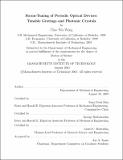| dc.contributor.advisor | Sang-Gook Kim, George Barbastathis and Lionel C. Kimerling. | en_US |
| dc.contributor.author | Wong, Chee Wei, 1975- | en_US |
| dc.contributor.other | Massachusetts Institute of Technology. Dept. of Mechanical Engineering. | en_US |
| dc.date.accessioned | 2005-05-19T15:38:05Z | |
| dc.date.available | 2005-05-19T15:38:05Z | |
| dc.date.copyright | 2003 | en_US |
| dc.date.issued | 2003 | en_US |
| dc.identifier.uri | http://hdl.handle.net/1721.1/17008 | |
| dc.description | Thesis (Sc. D.)--Massachusetts Institute of Technology, Dept. of Mechanical Engineering, 2003. | en_US |
| dc.description | Includes bibliographical references (p. [161]-173). | en_US |
| dc.description | This electronic version was submitted by the student author. The certified thesis is available in the Institute Archives and Special Collections. | en_US |
| dc.description.abstract | The advancement of micro- and nano-scale optical devices has heralded micromirrors, semiconductor micro- and nano-lasers, and photonic crystals, among many. Broadly defined with the field of microphotonics and microelectromechanical systems, these innovations have targeted applications in integrated photonic chips and optical telecommunications. To further advance the state-of-the-art, dynamically tunable devices are required not only for demand-based reconfiguration of the optical response, but also for compensation to external disturbances and tight device fabrication tolerances. In this thesis, specific implementations of strain-tunability in two photonic devices will be discussed: the fundamental diffractive grating element, and a photonic band gap microcavity waveguide. For the first part, we demonstrate high-resolution analog tunability in microscale diffractive optics. The design concept consists of a diffractive grating defined onto a piezoelectric-driven deformable membrane, microfabricated through a combination of surface and bulk micromachining. The grating is strain-tuned through actuation of high-quality thin-film piezoelectric actuators. Device characterization shows grating period tunability on the order of a nanometer, limited by measurement uncertainty and noise. The results are in good agreement with analytical theory and numerical models, and present immediate implications in research and industry. For the second part, we generalize the piezoelectric strain-tunable membrane platform for strain-tuning of a silicon photonic band gap microcavity waveguide. Additional motivation for this strain-tuning approach in silicon photonic crystals lies in: | en_US |
| dc.description.abstract | (cont.) (a) the virtual absence of electro-optic effects in silicon, and (b) the ability to achieve tuning with low power requirements through piezoelectric actuation. Compared to current thermo-optics methods, piezoelectric actuation affords faster and more localized tuning in high-density integrated optics. The small-strain perturbation on the optical resonance is analyzed through perturbation theory on unperturbed full 3D finite-difference time-domain numerical models. Device fabrication involves X-ray nanolithography and multi-scale integration of micro- and nano-fabrication methods. Experimental characterization achieved dynamically-tunable resonances with 1.54 nm tunable range (at 1.55 Mum optical wavelengths), in good agreement with theory. This is the first demonstration of strain tunability in photonic crystals and contributes to the development of smart micro- and nano-scale photonics. | en_US |
| dc.description.statementofresponsibility | by Chee Wei Wong. | en_US |
| dc.format.extent | 173 p. | en_US |
| dc.format.extent | 6392306 bytes | |
| dc.format.extent | 7334237 bytes | |
| dc.format.mimetype | application/pdf | |
| dc.format.mimetype | application/pdf | |
| dc.language.iso | eng | en_US |
| dc.publisher | Massachusetts Institute of Technology | en_US |
| dc.rights | M.I.T. theses are protected by copyright. They may be viewed from this source for any purpose, but reproduction or distribution in any format is prohibited without written permission. See provided URL for inquiries about permission. | en_US |
| dc.rights.uri | http://dspace.mit.edu/handle/1721.1/7582 | |
| dc.subject | Mechanical Engineering. | en_US |
| dc.title | Strain-tuning of periodic optical devices : tunable gratings and photonic crystals | en_US |
| dc.type | Thesis | en_US |
| dc.description.degree | Sc.D. | en_US |
| dc.contributor.department | Massachusetts Institute of Technology. Department of Mechanical Engineering | |
| dc.identifier.oclc | 54450066 | en_US |
